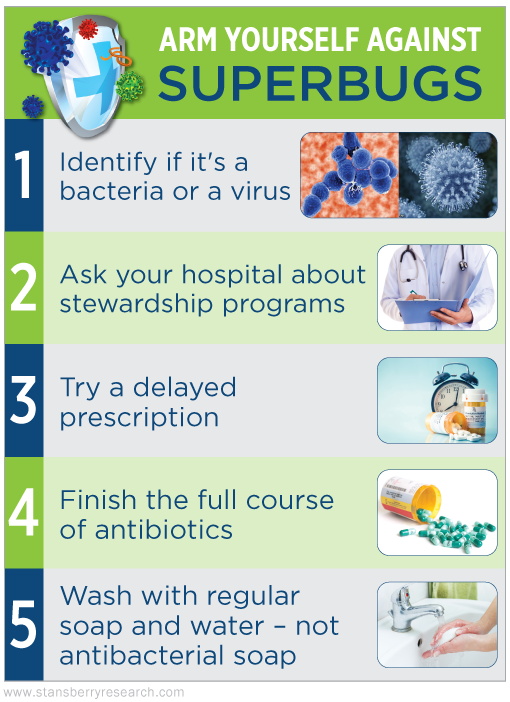The most dreaded, deadly superbug just hit U.S. soil...
Last month, a 49-year-old woman in Pennsylvania wound up in a clinic with a rare strain of E. coli. Sensational headlines... sounding like lines from a horror novel... followed the discovery.
Superbugs are bacteria that don't respond to at least one antibiotic. That means they are harder to kill... Doctors have to try multiple antibiotics to figure out which one is an effective treatment.
Even multidrug-resistant superbugs – those that are immune to more than one antibiotic – typically respond to a drug called colistin. It's one of a handful of medications called the "drugs of last resort."
Doctors prescribe these drugs infrequently so that bacteria don't have a chance to become resistant. They might be in low supply or have more serious side effects... Colistin, for example, is associated with increased kidney-damage risk.
The problem in Pennsylvania – the woman's E. coli was resistant to colistin.
"Last hope" drugs are no longer the end-all cure...
About 2 million people a year contract antibiotic-resistant bacteria. And around 23,000 of those folks die as a result, according to the Centers for Disease Control and Prevention.
Fortunately, the woman's bacteria did respond to a different class of last-resort antibiotics. But what's frightening about this latest case is that we don't know where the patient came into contact with the bacteria... Since the woman reported no travel outside the country in the prior five months, it's likely from a local source.
And now that this colistin-resistant gene is in the U.S., it could spread to other types of infections... a nightmare scenario that is already happening across Europe and China.
Ultimately, we're creating many of these superbugs ourselves.
I've written before about the dangers of using antibiotic products that contain triclosan. Triclosan is a chemical found in soaps and other cleaners that alters hormones and even weakens heart tissue.
But using antibacterial soaps with chemicals like triclosan also leads to the rise of superbugs. Repeatedly exposing bacteria to the same chemical builds up their tolerance. Over time, these bacteria become drug-resistant.
Longtime subscribers of Retirement Millionaire know I've warned about antibiotic overuse before. Superbugs also come from the abuse of antibiotics. The problem is overprescription.
A study published in the Journal of the American Medical Association last year revealed that 55%-80% of patients with acute bronchitis received antibiotics. That's a problem because the majority of bronchitis cases are due to viruses. And antibiotics can't kill viruses. Taking antibiotics when you don't need them exposes any bacteria in your body to the drug. That means those bacteria develop immunity to the drug, becoming superbugs.
[optin_form id="161"]
If you're not sure what's making you sick, ask your doctor. Don't take an antibiotic unless you know it's a bacterial infection.
Waiting also helps. Most of the time your body fights off infections on its own, but we go to the doctor for pills to feel better faster. The next time your doctor recommends an antibiotic, ask if he is certain you need it to fight off the infection. If he's not sure, ask for a delayed prescription. Docs date a delayed prescription several days after your appointment. That gives your body time to heal itself instead of taking a medicine that leads to superbugs.
Last year, the Obama administration pledged to fight the superbug epidemic. One of the ways to do this is to expand "stewardship" programs in hospitals across the U.S.
The goal of stewardship is to have impartial third parties (like infectious-disease experts and pharmacists) review doctors' antibiotic prescriptions.
One hospital in Tennessee saw improvements after just two years of using a stewardship program. The average length of patient stays shortened and the cost of antibiotics per patient lowered. So, if you need to go to the hospital, ask if they have a stewardship program.
Finally, always finish all of the antibiotics your doctor gives you. Taking the full prescription means wiping out the infectious bacteria. If you don't take all of the pills, some bacteria will survive. And since those bugs survived after exposure to the drug, they will resist that drug in the future.
While we can't stop all superbugs from growing, do what I do to help protect yourself. Make sure to talk to your doctor about any antibiotic prescriptions. And never use antibacterial soaps or hand sanitizers.
What We're Reading...
- A guide to antibiotic resistance from the BBC.
- Something different: A New Zealand penguin gets to show off his new 3D-printed foot.
Here's to our health, wealth, and a great retirement,
Dr. David Eifrig and the Retirement Millionaire Daily Research Team
June 14, 2016

